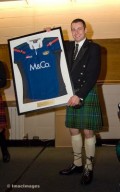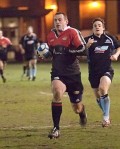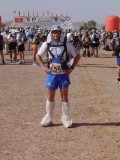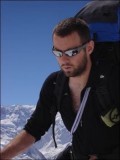|
Those of us who know Ricky Munday really nothing suprises--a talented rugby player who has completed the Sahara Marathon and climbed in the Himalayas but just read on
Good day everyone,
Just a quick update on my new career. I spent a week in Berlin at the offices of Johanniter International Assistance. My stress levels had been high in the build-up to my departure from the UK. I finished work on Monday and then spent Tuesday shopping and packing. I wasn't sure if I'd be able to make the 41kg weight limit that had been arranged for me but I made it with 5kg to spare. Essentially I was just taking clothes for my 6-month mission and things like DVDs and books to help the long evenings pass. I'd also been advised to take a good stock of toiletries as these are hard to get hold of in Nyala. And I was issued with my Johanniter visibility clothing so I have less space in my bags that I had before.
My first afternoon was spent with the Desk Officer for Sudan, who had been dealing with all of my admin arrangements and helped recruit me. It was great to finally put a face to a name. I also got a quick introduction to the 20 or so staff members based in Berlin. A new Country Director for DRC was also being briefed this week and we were briefed together. I was briefed on the background of Johanniter (Order of St. John), which dates back to the 10th century, http://en.wikipedia.org/wiki/Knights_Hospitaller , and had a thorough introduction to our projects in South Darfur and the living conditions and working conditions that I would face. The office in Nyala has a few "guest rooms" attached and this is where the Country Director and I are based. The Desk Officer had visisted Sudan in May for the first time and spent some time in Nyala. She told me that although there was electricity during the day thanks to an on-site generator, this was switched off at night and small lamps were used to light the house. She also told me that it is likely that I will often sleep on a bed outside because of the prevailing heat at night and the lack of air conditioning. It's true that we need the generator during thr day (and we have just bought a nice nesw one that has much more capacity but is much quieter), however often at night there is no city power and so it's almost impossible to slepp with no fan in my bedroom.The toilet outside is a just a hole in the ground. Last week I spent a few days being very ill and it was uncomfotable for sure. The cockroaches feeel evry at home. However, I;ve had experience of some horrific toilets on my expeditions in the past so that doesn't really concern me, although I never want to go in the middle of the night.
There's absoluteley no doubt that it will be a challenging 6 months in Nyala. The incumbent Country Director is leaving next month, the ex-pat Administrator in Khartoum and the ex-pat Medical Co-ordinator, who is in his 50s, left this month. Therefore by September I will be the longest serving International staff member in Sudan (and the only British citizen working for the organisation). A scary prospect indeed. The previous Financial Controller was only in place for a couple of months and left in February, citing family illness. However, she hadn't adapted to the very basic living conditions (i.e. a bucket for a shower) and hadn't built a strong relationship with the Country Director. I certainly feel like my previous expedition experience is standing me in good stead. In addition to the finance work, one of my first tasks was to represent Johanniter in court as there have been some issues with local staff contracts.
My briefing in Berlin covered finance, logistics, security and marketing. It was really a case of immersing me in the organisation and their culture and the world of humanitarian aid and I tried to soak up everything I'm learning like a sponge. It was incredibly exciting to finally have taken my first steps into a completely different world and way of life. When I arrived in Khartoum I had have some admin to negotiate and I started the process to get my work permit, although before thsi completed I travelled to South Darfus. I then undertook some intensive security training in Nyala over the course of 3 days. Car jackings are on the increase around Nyala and travelling to the remote areas where the projects are located is sometimes impossible due to inter-tribal clashes. In South Darfur there is no real rebel movement fighting the Government but there are regular inter-tribal skirmishes and it would be easy to get caught up in these. And of course Ed Al Fursan, where our ex-pat Medical Co-ordinator was based, was where 2 French Aid workers were kidnapped in the last couple of months. The French NGO (AMI) have now pulled out of the area and Johanniter are the only NGO now operating there. Although this does entail risk, it also means that we may have access to more donor funding since we are now the only people on the ground. And the intensive security training I undertook is designed to ensure that security is considered during project planning at all times.
My first couple of weeks were spent trying to sort outh the finances for May and June as the Country Director was overloaded with work. The Country Director currently didn't have a clear picture of expected cash flows from now until the end of September, when the project funding expires. There are effectively three separate budgets for the projects as they are co-financed by the German Foreign Ministry and the Common Humanitarian Fund, which is administered by the United Nations development Program. The third budget is effectively the contribution from Johanniter Unfall Hilfe e.V. (JUH), which is the German Order of St. John, and which is the wider organisation of which Johanniter International Assistance is but a small part. Unfortuantely all three budgets run over different timeframes so monitoring the budgets is complicated.
I was able to visit the project sites not long after I arrived in Nyala and it was great to see the Primary Health Care units that we had built in remote areas of South Darfur. We have six units where we provide drugs and pay the staff salries, with a view to handing over the units to the Ministry of Health in the short/medium term. Although the area where we work is not considered to be a humanitarian emergency, the MoH still requires considerable support to reach the local population and meet their health needs. Access to the project sites is incredibly difficult during the wet season (from July to October) so they have been stocked with enough drugs to see them through this potentially difficult period. As an organisation, we service the primary health care needs of one fifth of the Ed Al Fursan locality (c 100,00 people)
From a persoanl point of view, I have been working long, long hours to understand how the project works and catch up with the historic finance issues but I am starting to feel like I'm getting on top of things and I'm able to relax just a little. Living and working with one other ex pat will prove to be the most demanding thing and hopefullly we will soon have air conditiong, which will make or working conditions much more comfortable. Working in 40 degree heat for 12 hours a day takes a toll. I have started running early in the morning to keep myself fit as it is impossible to exercise at any other time of the day. However, I have to run in trousers so as not to offend the locals.
The Sudanese Government has a department called HAC (Humanitarian Aid Commission) that we have to liaise closely with. They are responsible for issuing travel permits to allow staff to trabel to Darfur. Unfortunately I was isuued with a tourist visa from the Sudanese Embassy in London when I applied for a work visa and we are in an administrative cock fight to try to reslove this and allow me to be issued with a resident visa and work permit. This has implications for my ability to leave the country on R&R so everthing in Sudan is a huge effort.
However, overall, I don't mind the long hours and the limited social life. Of course, living in a compound behind walls does make me feel trapped to some extent but I know that the work I'm doing will benefit our beneficiaries in the end by making us more efficient and I still feel really lucky to have this opportunity. When I read about pre-season rugby training taking place in Glasgow I do miss it but I think that I am lucky to be here in Darfur and I'm determined tio make the most of this opportunity.
It's difficult to find time to send updates but I'll try to do so at least once a month.
Cheers, Ricky.
That's all for now. Ricky.
This article was originally posted on 24-Jul-2009, 22:31 by Hugh Barrow.
Last updated by Hugh Barrow on 24-Jul-2009, 22:32.
|










